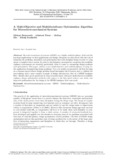JavaScript is disabled for your browser. Some features of this site may not work without it.
| dc.contributor.author | Farnsworth, Michael | |
| dc.contributor.author | Tiwari, Ashutosh | |
| dc.contributor.author | Zhu, Meiling | |
| dc.contributor.author | Benkhelifa, Elhadj | |
| dc.date.accessioned | 2017-12-15T15:58:39Z | |
| dc.date.available | 2017-12-15T15:58:39Z | |
| dc.date.issued | 2017-09-14 | |
| dc.identifier.citation | Farnsworth M, Tiwari A, Zhu M, Benkhelifa E. (2018) A multi-objective and multidisciplinary optimisation algorithm for microelectromechanical systems. In: NEO 2016. Studies in Computational Intelligence, Volume 731, pp. 205-238 | en_UK |
| dc.identifier.isbn | 978-3-319-64062-4 | |
| dc.identifier.issn | 1860-949X | |
| dc.identifier.uri | https://doi.org/10.1007/978-3-319-64063-1_9 | |
| dc.identifier.uri | https://dspace.lib.cranfield.ac.uk/handle/1826/12768 | |
| dc.description.abstract | Microelectromechanical systems (MEMS) are a highly multidisciplinary field and this has large implications on their applications and design. Designers are often faced with the task of balancing the modelling, simulation and optimisation that each discipline brings in order to bring about a complete whole system. In order to aid designers, strategies for navigating this multidisciplinary environment are essential, particularly when it comes to automating design synthesis and optimisation. This paper outlines a new multi-objective and multidisciplinary strategy for the application of engineering design problems. It employs a population-based evolutionary approach that looks to overcome the limitations of past work by using a non-hierarchical architecture that allows for interaction across all disciplines during optimisation. Two case studies are presented, the first focusing on a common speed reducer design problem found throughout the literature used to validate the methodology and a more complex example of design optimisation, that of a MEMS bandpass filter. Results show good agreement in terms of performance with past multi-objective multidisciplinary design optimisation methods with respect to the first speed reducer case study, and improved performance for the design of the MEMS bandpass filter case study. | en_UK |
| dc.language.iso | en | en_UK |
| dc.rights | Attribution-NonCommercial 4.0 International | * |
| dc.rights.uri | http://creativecommons.org/licenses/by-nc/4.0/ | * |
| dc.subject | Microelectromechanical systems | en_UK |
| dc.subject | MEMS and multidisciplinary | en_UK |
| dc.subject | Multi-objective optimisation | en_UK |
| dc.subject | Evolutionary computation | en_UK |
| dc.title | A multi-objective and multidisciplinary optimisation algorithm for microelectromechanical systems | en_UK |
| dc.type | Book chapter | en_UK |
Files in this item
The following license files are associated with this item:
This item appears in the following Collection(s)
-
Staff publications (SATM) [4365]

